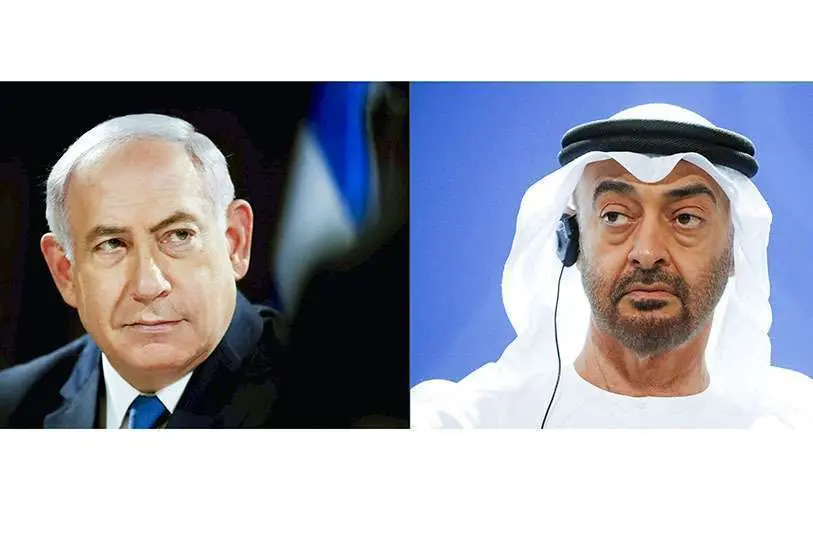Emirates and Israel break the deadlock in the Middle East

They are two of the most technologically advanced countries in the world, and are also two key pieces in the shaping of a region considered the hottest on the planet. Now, the United Arab Emirates (UAE) and Israel are breaking with their agreement the dangerous status quo that had been installed in the Middle East, thanks to which the path towards a stable peace was looking increasingly distant.
The agreement establishing full diplomatic relations between the two states shows that the Arab and Israeli worlds can change their traditional relationship from one of hostility to one of active cooperation, and consequently change a dynamic that seemed to have no other way out than the permanent threat of war. The Israeli Prime Minister, Benjamin Netanyahu, is aiming at an important diplomatic success, insofar as he places this Agreement, which will bear the name of Abraham, the patriarch of the three religions of the Book, in line with those signed with Egypt (1978) and Jordan (1994). Netanyahu is now confident that another quarter of a century will not pass until the next one, and that he himself will be able to write a new success by normalizing relations with other Arab countries.
The Israeli concession for this agreement has not been the renunciation of the annexation of one third of the occupied West Bank, on whose territory half a million Jewish settlers are already settled, but a temporary delay in the implementation of that measure. The UAE maintains that, despite the fact that this renunciation is an instant freeze, they are reassuring their support for the Palestinian people, their dignity, their rights and their own sovereignty as a State, pointing out that the supposedly buried viability of the two-State solution, Palestinian and Israeli, can be revived. Much work would have to be done, however, by Emirati diplomacy to convince the Palestinians of that vision, some of whose leaders disregarded such promises and described the agreements as a "stab in the back".
US President Donald Trump sets himself up as the facilitator of the agreement, which is noted as a foreign policy triumph with important repercussions in his own country in view of the elections on November 3. It thus interrupts the sharp and continued decline in his popularity ratings, brought about by a manifestly disastrous management of the coronavirus pandemic and, in view of the data, the foreseeable failure to deliver on his promise of a decisive lifting of a free-falling economy. Trump wants a White House show similar to the one Carter celebrated with Menahem Begin and Anwar El Sadat, and which Clinton blessed between Yitzhak Rabin and Yasser Arafat. Trump supposes that his image between Netanyahu and Sheikh Mohammed Bin Zayed al-Nahyan will provide him with important electoral returns, which will disdain the disadvantage that at the moment all the polls show him as opposed to the democratic tandem Joe Biden-Kamala Harris.
For the UAE, this Abraham Agreement means more than just bringing to light cooperation with Israel that has been going on behind the scenes for twenty-five years. It represents a major qualitative leap in the UAE's ability to influence the shaping of the new geopolitics of the Gulf. If, for example, the coronavirus vaccine achieved jointly by Israel and the UAE becomes a reality, the multiplier effect of such cooperation will be decisive in demonstrating to the most reluctant Arabs and Jews the advantages of working together in peace.
The potential of future Muslim visitors to Islam's second most important pilgrimage site, the Al-Aqsa Mosque in Jerusalem - Al Quds, according to the Arab denomination - will also be no less important, as a result of these agreements, which provide for the establishment of direct flights between Abu Dhabi and Tel Aviv. Furthermore, the intensification of such human contacts will facilitate the conclusion of investment pacts in all sectors of the economy in which both Israel and the UAE are at the top of the world ranking.
The clear loser of the Abraham Agreements is Iran, which has never given up either its aspiration to become the leading power in the Gulf or, of course, the destabilisation of the Gulf monarchies. Israel, which was singled out as a common enemy of Islam, can now work together, at least with the Sunnis, and also contribute to the stability and prosperity of countries that want to work in peace, in return for the recognition of their right to exist and not have to live under the permanent threat of being destroyed.

